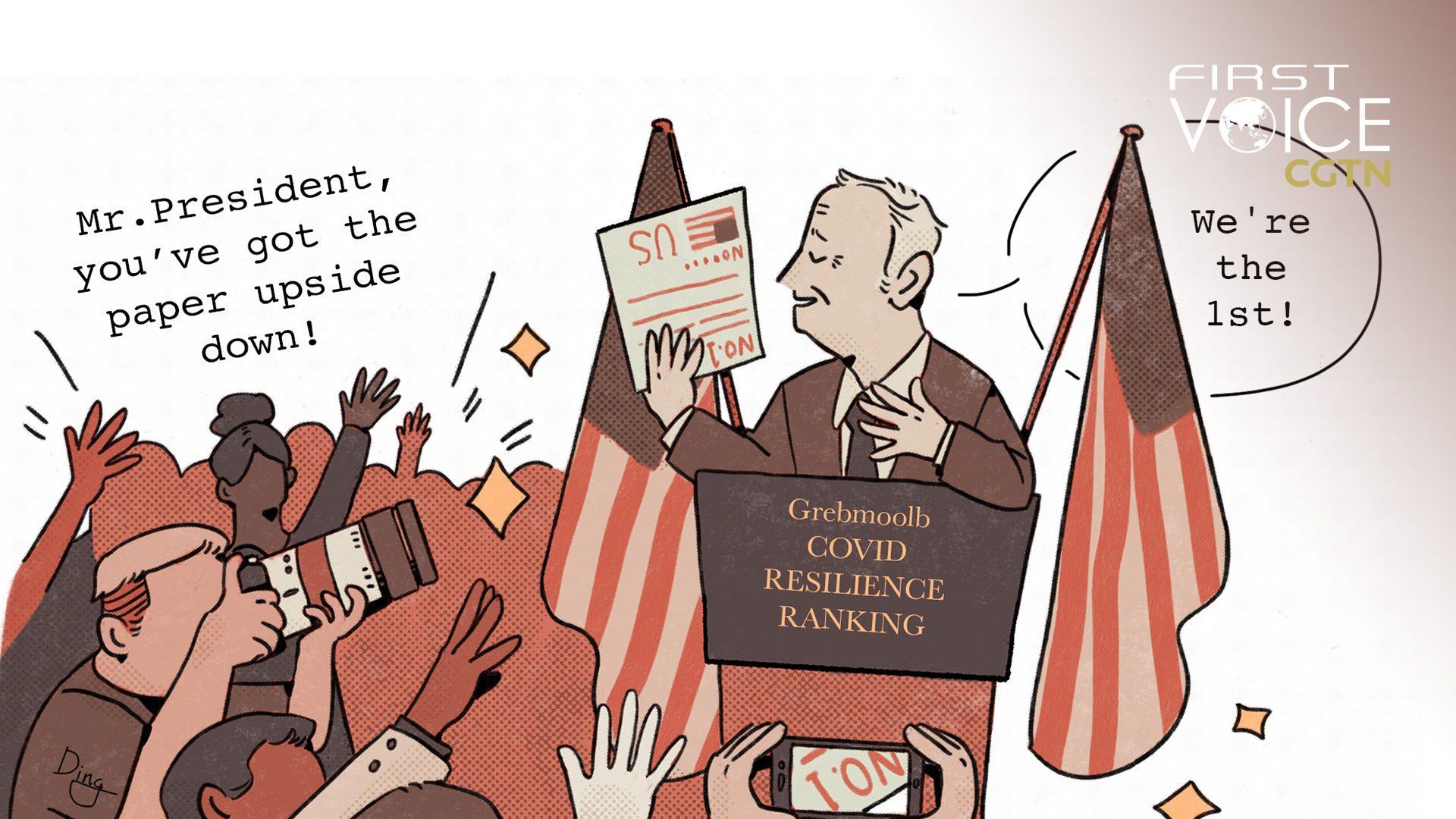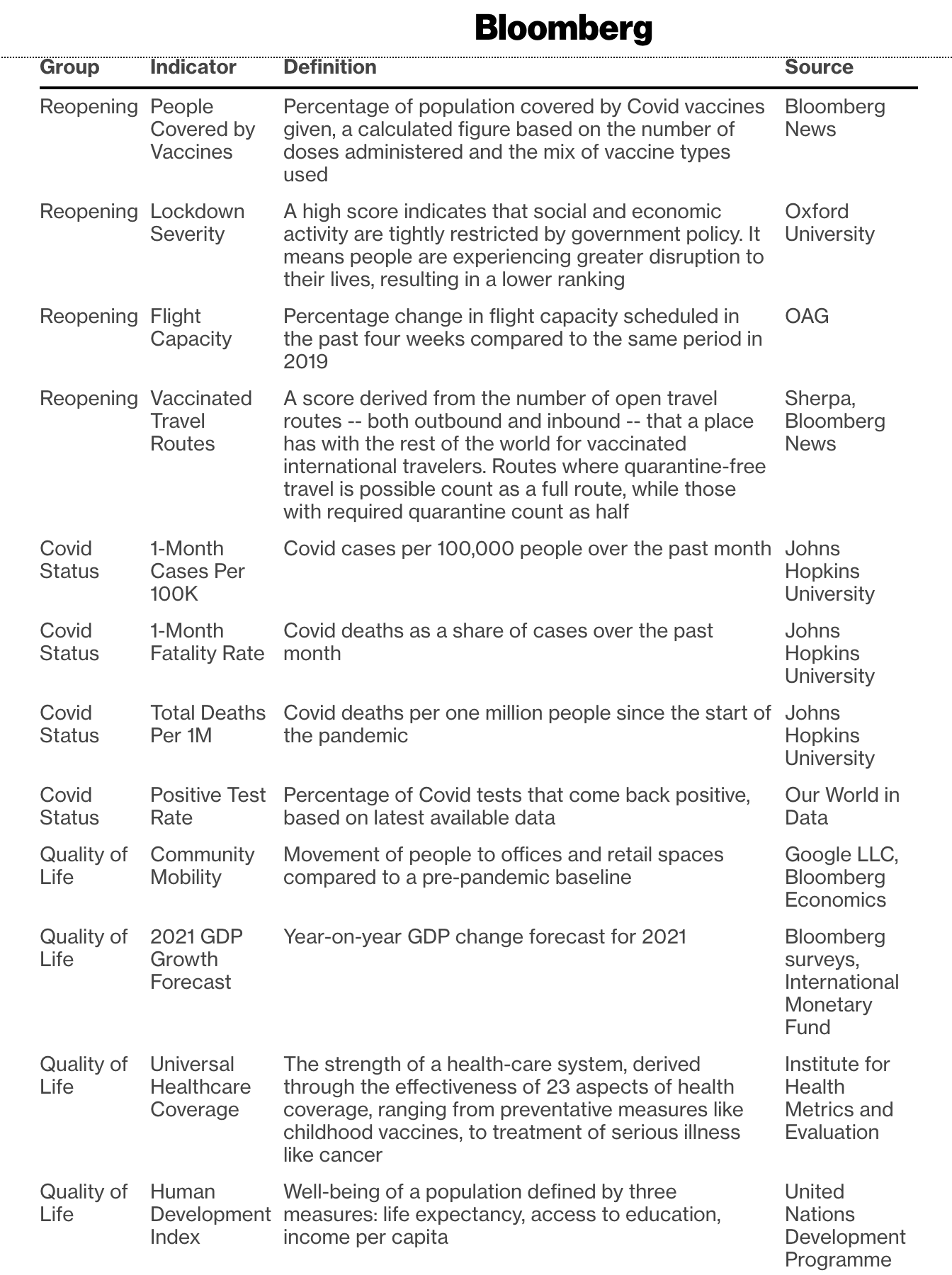
Editor's note: CGTN's First Voice provides instant commentary on breaking stories. The daily column clarifies emerging issues and better defines the news agenda, offering a Chinese perspective on the latest global events.
Bloomberg's latest COVID Resilience Ranking has been raising eyebrows around the world. The ranking purports to name "the best and worst places to be" amid the COVID-19 pandemic, with the United States ranked the best.
Never mind that hundreds of people are still dying in the U.S. each day from the pandemic or that COVID-19 restrictions and precautions are being dropped even though less than half of the country is fully vaccinated against the virus, or that cases nationwide are again on the rise as the delta variant becomes dominant, or that the number of COVID-19 cases has doubled from a week ago. According to Bloomberg, the most important thing now is "normalization" – the ability to "turn back the clock and return to pre-pandemic times."
In Bloomberg's latest rankings, the U.S. jumped to the top of the list for the first time. The explanation is that America "reflects a best-case scenario of high vaccinations, a waning outbreak, flight capacity nearing full recovery, and few travel curbs on vaccinated people." And it is the result of Bloomberg changing the way it has done the calculation by adding "the ease and moving in and out of a place" and "how much air travel has recovered" to the factors it considers.
Doing so, Bloomberg admits, penalizes places that still conduct lockdowns to fight outbreaks. Lockdowns are inherently bad, according to Bloomberg, because they reflect "a failure to progress." Lockdowns also correlate with "the mental and economic toll of the virus on a population." Even small, localized lockdowns are apparently unacceptable. Bloomberg justifies this by saying that a handful of cases can trigger "the sorts of restrictions highly vaccinated places are abandoning."
This metric betrays a very strong pro-business bias, which is not surprising given that one of Bloomberg's main jobs is to provide financial data to its corporate clients. However, what is surprising is how little the human toll of the pandemic is reflected. The ranking system hardly revolves around the lives of people. Of the 12 components, four measure the speed of lifting coronavirus restrictions as if that is always and incontestably a good idea – rather than the root of the high death rate in many countries. Out of the four that measure "Quality of Life," two could be simply counted as measuring economic activity.

A screenshot of Bloomberg's COVID Resilience Ranking components.
A screenshot of Bloomberg's COVID Resilience Ranking components.
In this way, the more than 600,000 COVID-19 deaths the U.S. has suffered barely register in the metric – they are apparently old news. The U.S. has suffered the highest death toll from coronavirus in the world. This is largely because of behaviors that Bloomberg has given positive marks for in the ranking, such as refusing to implement effective lockdowns in a timely manner, refusing to control the movement of people likely to be spreading the virus and refusing to implement the kind of safety restrictions that could have saved lives.
In a way, Bloomberg's COVID Resilience Ranking supports the policies of the previous administration. Keep the economy humming; nothing else matters.
Everything about U.S. society ultimately revolves around corporate interests. This is not a surprise since corporations and their lobbyists seem to be majority stakeholders in the nation's politics. The interests of the American people come last. This includes the U.S. response to deadly threats like COVID-19 and climate change. It also includes policies around health care, campaign finance, access to education and the growing gap between the rich and everyone else.
Bloomberg's Covid Resilience Ranking is not actually "measuring" anything. Looking back, the priorities reflected in this metric are the same priorities embodied in U.S. policy, from the beginning of the outbreak to the present moment. It is advocating the removal of epidemic-related barriers to doing business. This corporate-centered approach to fighting the epidemic is quite typical of how the U.S. government functions.
Bloomberg has misnamed its Covid Resilience Ranking. It should be called the Covid Inconvenience to Corporations Ranking. And this ranking destroys Bloomberg's credibility.
(If you want to contribute and have specific expertise, please contact us at opinions@cgtn.com.)

